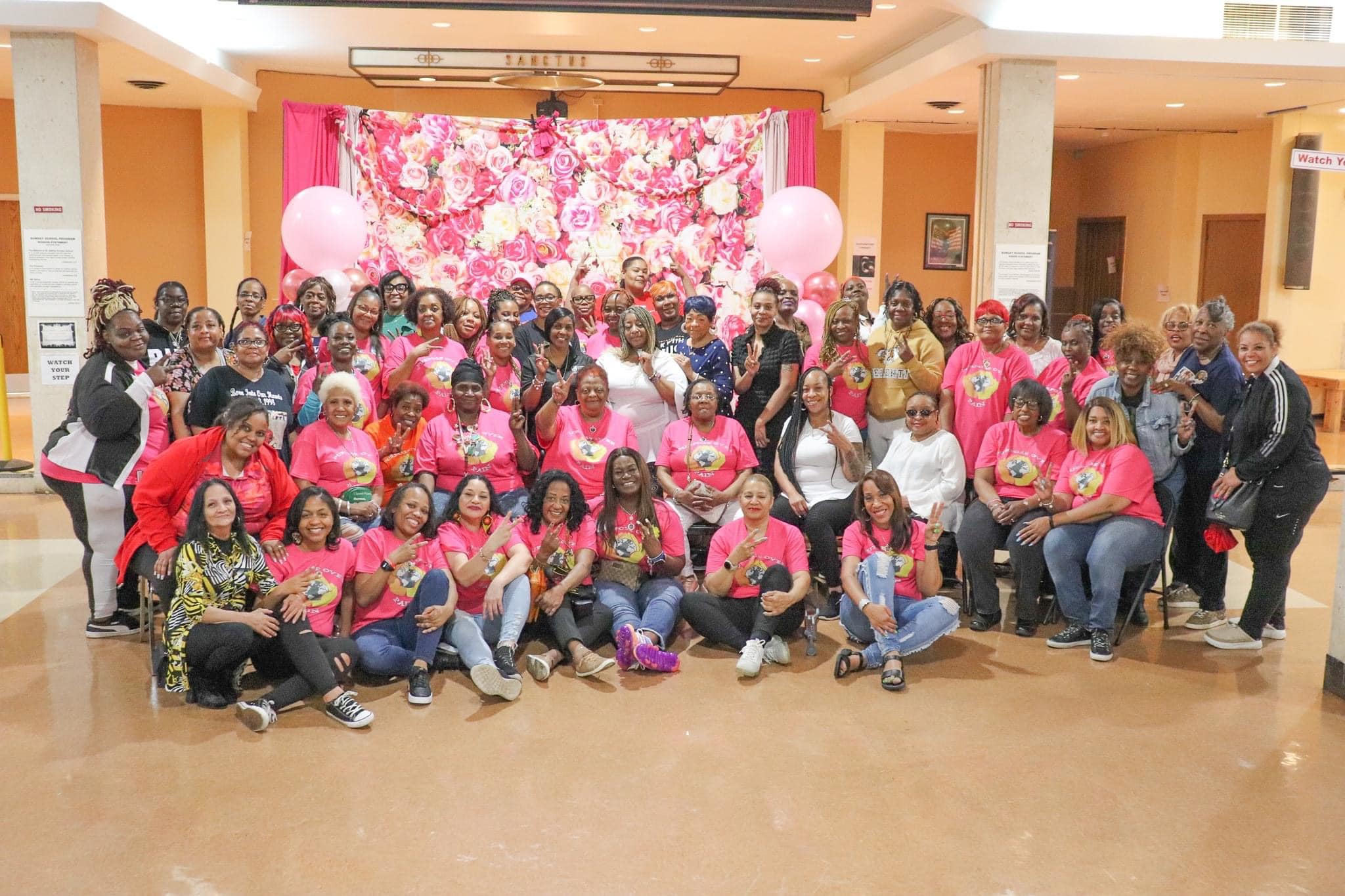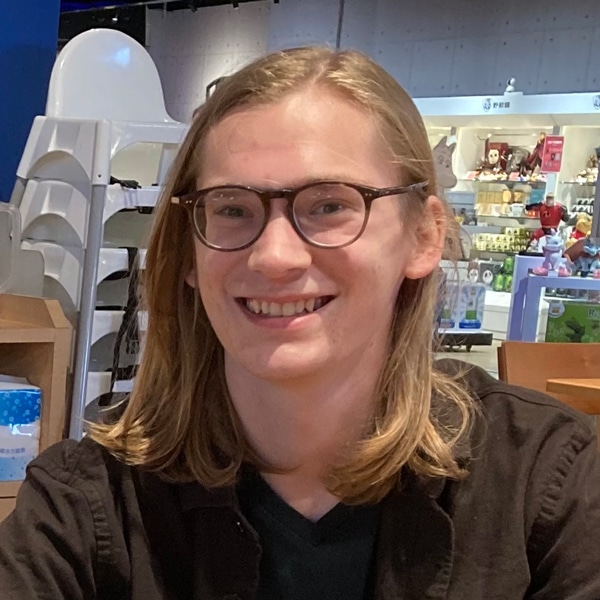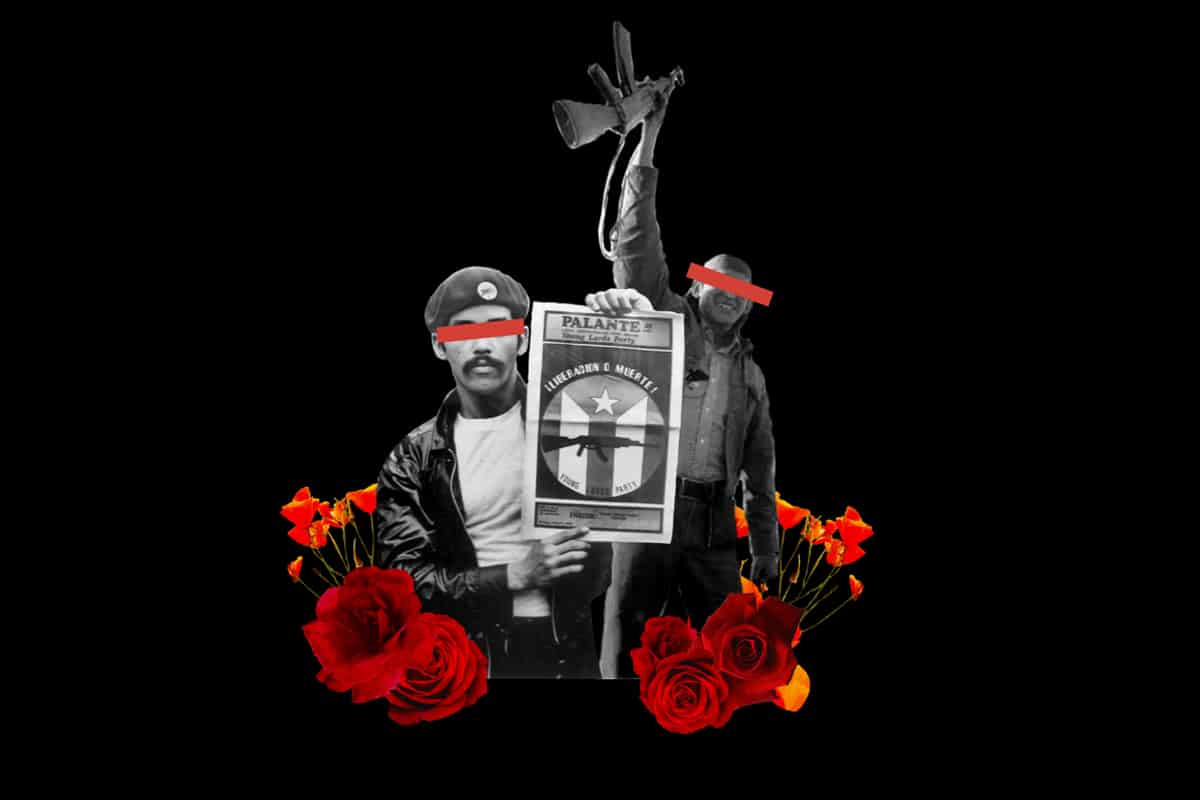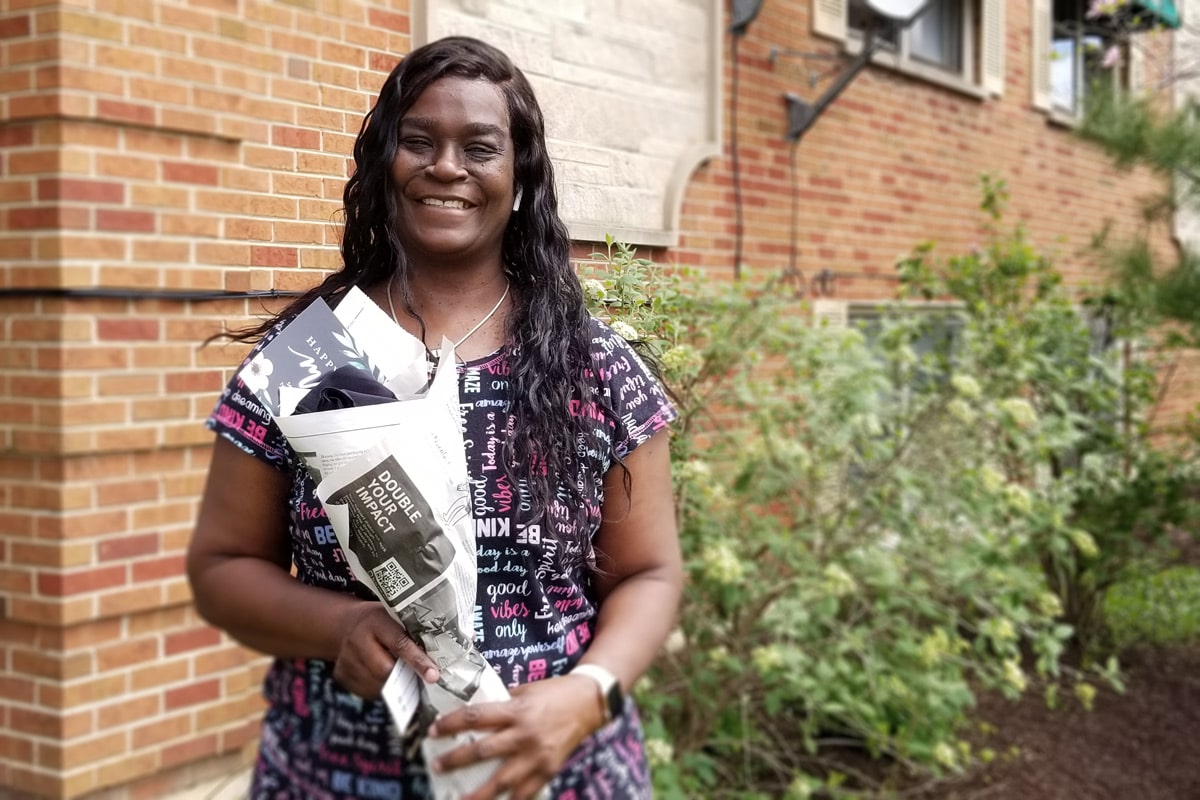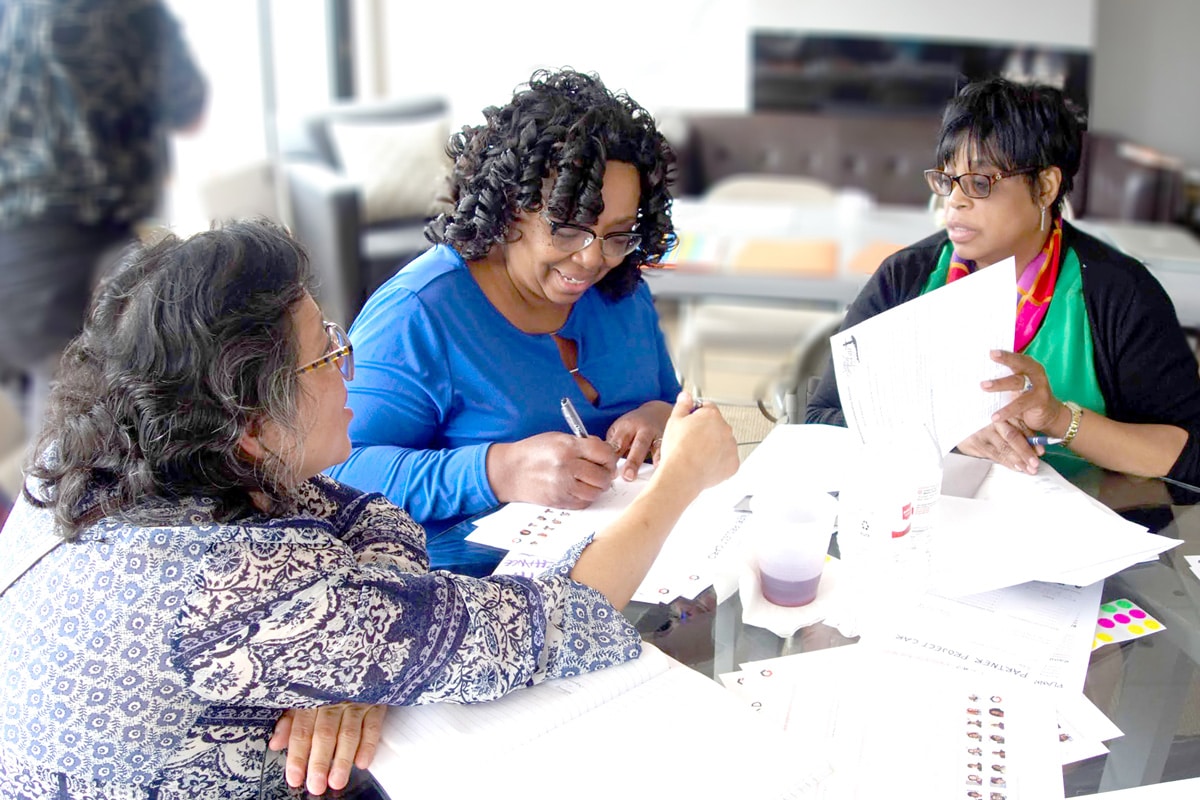A New Resource for Victims of Gun Violence
By: Zeki Salah, Communications Associate
A new resource for families of victims of gun violence was recently launched by 2020 Chicago Peace Fellow, Pamela Montgomery-Bosely. Her organization, Purpose Over Pain, recently launched a 24-hour crisis response hotline for people coping with the loss of a loved one from violence. The hotline is active from 7pm on Friday to 7pm on Sunday and can be reached by dialing 872-3CRISIS or (872) 327-4747.
Since its inception in 2007, Purpose Over Pain has expanded from a small non-profit run by parents of victims of gun violence to an organization with full-time staff that work Monday through Friday. The organization provides positive development activities for children and youth, advocates for and promotes safer communities, and strengthens families by providing crisis support to parents or guardians whose children have been victims of gun violence. Most of Purpose Over Pain’s services are provided on weekdays, which up until now has left a gap in the services provided to families of victims of gun violence over the weekend.
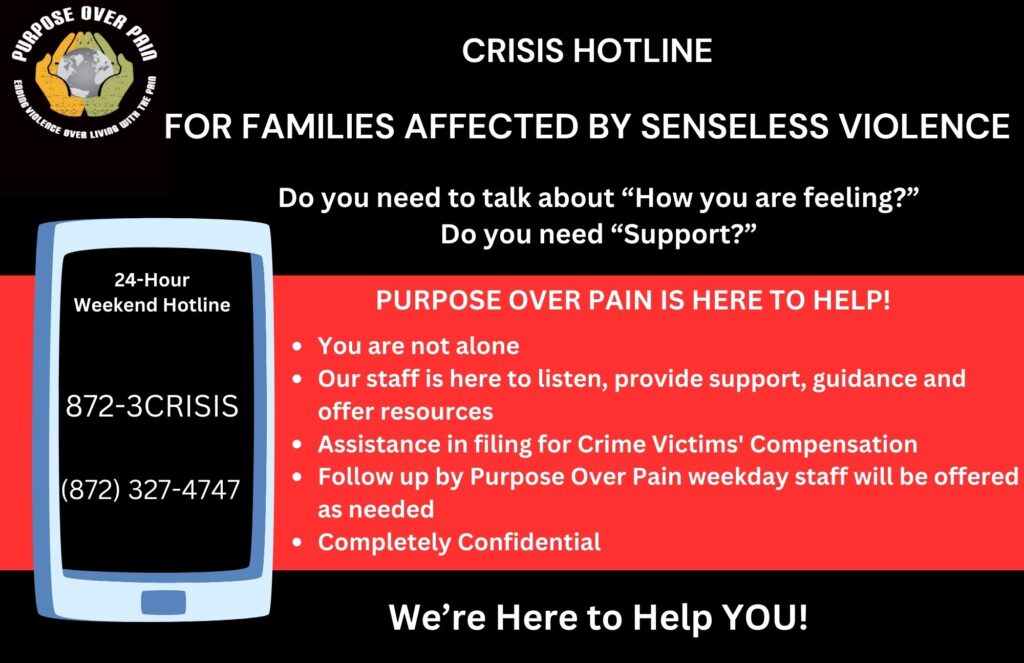
The crisis response hotline is intended to serve families at any point during the weekend, which is when gun violence tends to peak. Prior to opening the hotline, Purpose Over Pain would receive messages and calls throughout the weekend from people needing support after friends or family members had become victims of gun violence. Pam explains:
“Over the weekend, people struggle, because that's when the violence is extremely high. So, while we are available Monday through Friday, I wanted to be available on the weekends, but not my full time staff since they are survivors too.”
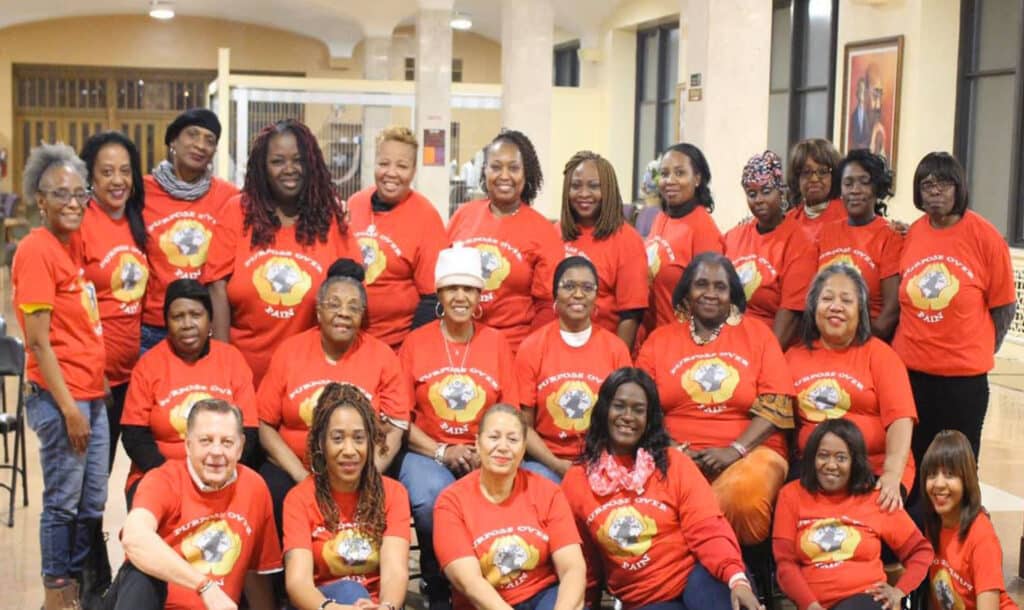
Purpose Over Pain hired four operators to work the gun violence prevention hotline over the weekend, so that Purpose Over Pain’s existing staff would not be overburdened.
All of the operators have first hand experience with gun violence, having lost either children or relatives, and are trained to listen to and provide guidance to people dealing with a tragic loss. Pam describes the role of the responders:
We want to be there to support people and let them know that they’re not alone. Our staff is there to listen. Many parents have their children shot and killed in the middle of the night and might receive a call at 2 in the morning with the news. You can’t sleep after news like that, so we wanted to make sure that there is someone there to listen to them, to provide support, to provide guidance, and to provide resources.
Pam also works on the hotline covering for the other responders in case they are unavailable or if it is the anniversary date of their loved one being murdered.
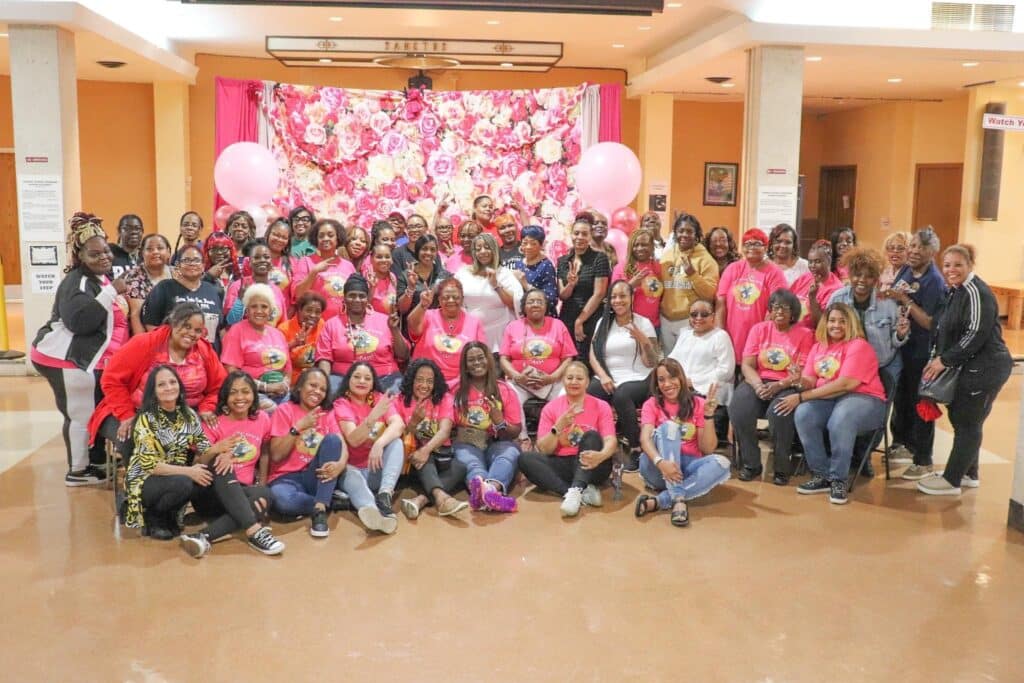
Resources that the operators can link victims include support circles, counseling, financial resources, and job programs. Purpose Over Pain offers memorial services, support days, and mentoring sessions as part of its regular programming. Hotline operators can also link victims to outside resources. For instance, hotline operators often help victims fill out a Crime Victim Compensation Form. This form is part of the Illinois Attorney General’s Crime Victims Compensation Program which is intended to reduce the financial burden imposed on victims of violent crime and their families by providing up to $45,000 for expenses incurred by eligible victims as a result of a violent crime. Purpose Over Pain also has a full resource book that can link victims to programs that provide housing, food, clothes, and jobs. They network with other organizations, such as St. Sabina’s, so that they can connect victims with resources close to them and that are relevant to their needs.
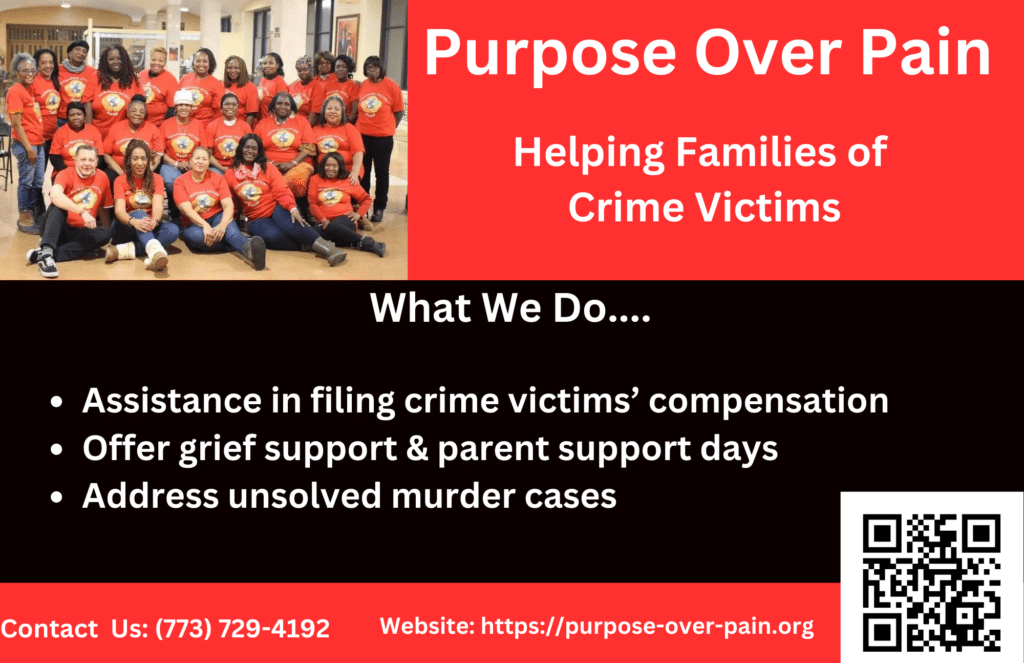
Purpose Over Pain’s hotline is the first of its kind in Chicago, previously there was no 24-hour crisis hotline for the friends and families of victims of gun violence. Now, victims can be supported by community members that have lived through similar experiences. Pam emphasizes, “When you call and they pick up the phone you’ll have a survivor, someone who understands what you’re going through. It’s not like you’re getting an automated message, you’re getting a live voice. I don’t want people to think they’re alone because they’re not, we’re here for them.” The Purpose Over Pain hotline has been created by community members for community members and will continue to provide pertinent and needed care to victims of gun violence.
Crime Stoppers Microgrant Awarded to StickTalk
By Cree Noble, Team Coordinator
Last summer, our 22 Chicago Peace Fellows collaboratively designed and supported a wide range of peace building projects using a dedicated pooled fund for violence prevention. When creating projects, Annette Kelly noticed many of these projects dealt with youth, health, and well-being, but not with crime prevention directly. During the summer, she voiced her idea about having a project called Crime Stoppers that would address the violence in Chicago by directly engaging with those most likely to be a perpetrator or victim of crime.
Annette’s idea was well received by many fellows, but Dorothy Thompson and Tia Brown really stepped up and helped Annette with the formation and execution of this plan. The Crime Stoppers team met biweekly to figure out what was the best course of action. A few ideas about violence prevention were brainstormed such as hosting workshops around the topic, but after weeks of discussion, the team decided they wanted to give out a microgrant to a nonprofit who was already working with violence prevention.
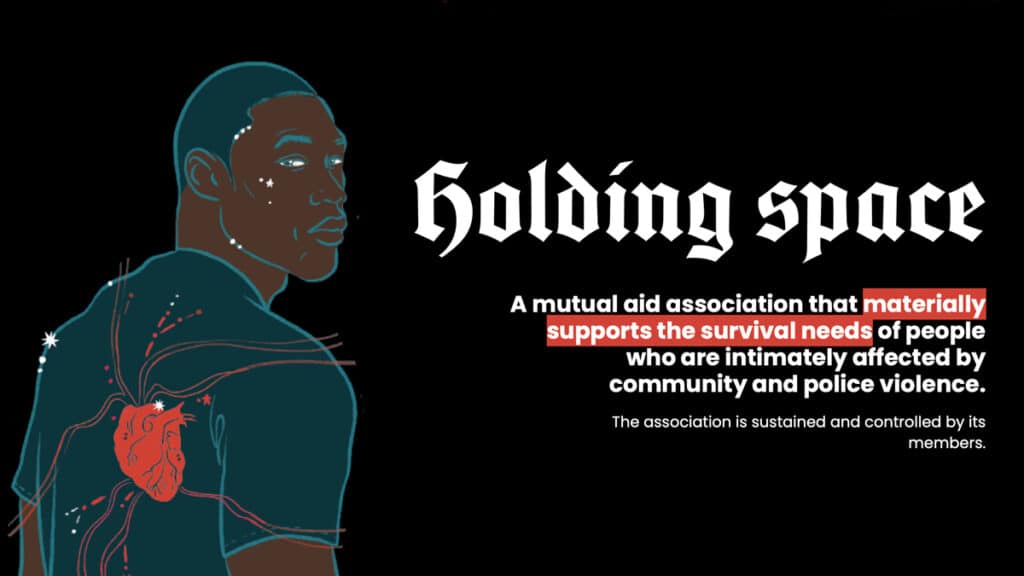
The application process was detailed and strategic in order to find the best candidate for this microgrant. Annette states, “we wanted to cast our nets wide” and wanted to look for an organization without all the “bells and whistles.” The microgrant was for $2,000 and 36 organizations applied. For the selection of the microgrant, Annette, Tia, and Dorothy came up with a rubric to follow as well as a scoring system. They ranked each group according to their mission statement, the population they served, and what they planned to do with the money.
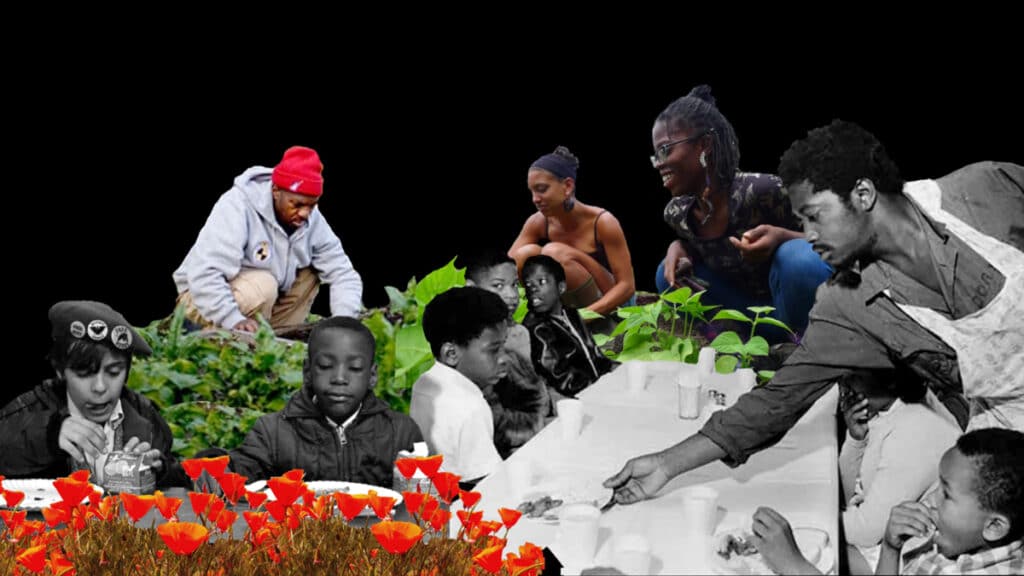
After weeks of going through each application, the organization Stick Talk was the recipient of the microgrant. According to Stick Talk’s website, “We reassess urban gun violence through the prisms of harm reduction and mutual aid. Our intention: to reduce the number of young Black people who are living at the edge of fatality, and to interrupt the demonization and criminalization of their politics of survival.” Tia says, “Stick Talk was the perfect organization for what we were looking for in a winner.”
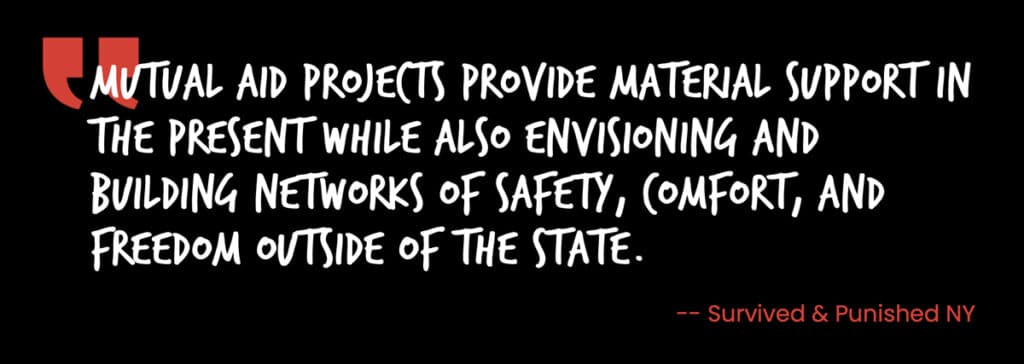
Crime Stoppers looks forward to seeing the grant be put in use at Stick Talk. They are also hoping to use extra funds they have to help families who have been impacted by violence.
Peace is Blooming in Chicago
On Sunday, May 3rd the Chicago Peace Fellows launched the Peace Flowers campaign by delivering over 75 flower bouquets to mothers that have lost children to violence.

The Peace Flowers campaign is a collective response from the Chicago Peace Fellows Mutual Aid Collaborative comprised of 38 peace organizations throughout Chicago who are working togehter to address the twin epidemics of COVID-19 and violence in Chicago.
Violence is rising in Chicago in the same south and west side neighborhoods most impacted by COVID-19 where the Peace Fellows live and work. With funding for frontline peace-building organizations often diverted to respond to the coronavirus, the Mutual Aid Collaborative is building sustainable social impact models to raise funds and create jobs.

"Peace Flowers is an innovative and easy way to fund these organizations while also investing in sustainable job creation on the south and west side of Chicago where these lovely blooms are grown."
Quilen Blackwell, Chicago Peace Fellow, Chicago Eco House

Pamela Bosley, Co-founder of Purpose Over Pain, works with mothers to connect them with each other to build a community of support.
“Many of the moms have a hard time with Mother’s Day. With the pandemic, it’s been even harder. Many mothers are reporting problems with depression and other issues related to being disconnected.”
Pamela Bosley, Chicago Peace Fellow, Purpose Over Pain
Quilen Blackwell, Owner of Southside Blooms, a social enterprise that helps youth in Englewood find opportunities in urban farming. They work to build a sense of entrepreneurship to help youth see opportunity and way out of drug trade. Quilen saw an opportunity to support Pamela’s group by providing them with beautiful bouquets in honor of Mother’s Day and to help lift their spirits. “The flower market is in huge disruption right now. 80% of flowers are imported from overseas and due to the trade issues related to the corona virus, most flowers need to come from domestic sources.” Quilen noted.

AnnaMaria Leon, Co-owner of Homan Grown, saw a collaboration in the making. She noted how this idea can be more than just a single action but, can be a part of a broader strategy to support mothers and fund projects for the Chicago Peace Fellows. She contacted her friend, Pascal Sabino, a local reporter for Block Club Chicago who wrote a powerful article about the project. The story was also featured by ABC7 in this compelling feature.
Once the funding and logistics were done, the team came together to prepare and deliver the flowers. The flowers were delivered to families across Chicago and the surrounding suburbs. The deliveries added a personal touch because they were distributed by Southside Blooms, Annamaria, and myself as Director of the Chicago Peace Fellows.
"I personally got the witness the joy and gratitude of the moms who received bouquets. It was a very moving experience to hand out flowers and cards that reminded the moms “You are not forgotten.”
Burrell Poe, Director, Chicago Peace Fellows
The deliveries were bittersweet, acknowleging the loss of family members but also because the deliveries were contact-less. No handshakes, no hugs, and at least 6ft of physical distance. Masks, gloves and hand sanitizer made this gesture different that it would have been prior to COVID-19. However, it made it all the more important because, people are suffering on top of the suffering that has already befallen their lives.
"Wonderful. Wonderful, it really made my day," said Elizabeth Bolden, a mother who received the bouquet.
The project has thus far raised over $5000 on GoFundMe and is entering into the next phase of it's social impact model where the public can purchase a subscription for flower delivery that also funds violence prevention work through the Chicago Peace Fellows Mutual Aid Collaborative.

Project oragnizers at Southside Blooms and Homan Grown will hire local youth to grow and arrange the flowers and donate a percent of their sales through the Peace Flowers campaign to support this network grassroots peace organizations on the West and South sides of Chicago plagued by the twin epidemics of violence and COVID-19.
"The goal is to create a long term sustainable funding stream for peace organizations in Chicago so that these groups have greater freedom at doing what they do best: making Chicago a more peaceful and beautiful place to live!"
Learn more about the Peace Flowers program at SouthSide Blooms
2019 Chicago Peace Fellows Report
For nearly two decades, the Chicago-based Goldin Institute has worked to build the capacity and amplify the voices of grassroots organizers in communities contending with the most challenging circumstances on Earth. In late 2018, the Goldin Institute was asked to design a course for grassroots organizers by the Partnership for Safe and Peaceful Communities, a coalition of 40 Chicago-based foundations who are aligning their investments to support proven and promising approaches to reducing gun violence. The Goldin Institute relied on its extensive global experience to create the Chicago Peace Fellows.
The Peace Fellows is a curriculum and fellowship designed to support individual organizers who are prior grantees of the Partnership’s Chicago Fund and are working to stop violence and create opportunities for their neighbors to collaborate in promoting more peaceful communities across the city. The inaugural class of 18 Peace Fellows graduated in November 2019 after more than six months of collaborative learning and joint projects.

The Goldin Institute designed the Peace Fellows course in collaboration with previous Chicago Fund grantees and input from a wide range of civic stakeholders. Based on the advice they received, staff adapted GATHER, the Goldin Institute’s tablet-based curriculum that teaches a series of core social change concepts and tools for authentic community engagement for grassroots leaders across the globe, to fit the newly formed group of local neighborhood changemakers, enhancing the online course with in-person workshops and meetings with a wide range of civic leaders in Chicago.
The 18 Chicago Peace Fellows were selected from a pool of over 50 applicants who all live and work in community areas on the city’s South and West sides that are disproportionately affected by crime and violence. Each Peace Fellow received a stipend and an iPad pre-loaded with the GATHER software and curriculum. Connecting Chicago leaders through GATHER allowed Fellows to explore key concepts around social change and leadership development digitally while they continued playing key roles in their community organizations as they completed the course.

On March 8, 2019, the Peace Fellows convened at DePaul University for the launch of the program where they discussed their leadership styles and got to know their peers. Over the following several weeks, the Chicago Peace Fellows developed deep bonds and determined together the principles and practices that would enable them to learn and work together as a community of practice.
The experience continued through the exercises in the curriculum and a wide variety of in-person workshops highlighting key violence prevention skills and introductions to other organizations doing important violence prevention work in the city. Fellows also had access to elected officials and institutional leaders in Chicago and beyond.

Throughout the program, Fellows participated in over 50 events and workshops hosted by partner organizations, including:
- The City Club of Chicago presentation on Crime and Criminal Justice in Chicago led by Professor Jens Ludwig of the University of Chicago Crime Lab.
- A meeting with the Violence Interruption Team at the University of Chicago Trauma Center.
- A conversation with author Edgar Villanueva about his book, “Decolonizing Wealth.”
- A conversation with Chicago artists on the Role of the Arts in Social Justice followed guided tour of the Chicago Cultural Center exhibit by Cecil McDonald, Jr.
- An Asset Mapping workshop with John Zeigler of the DePaul’s Egan Center and the Asset Based Community Development Institute.
- A workshop on appreciative inquiry followed by a guided tour of the Garfield Park neighborhood with the outreach team at Breakthrough Ministries.
- A presentation by Chicago Police Department Superintendent Eddie Johnson with a question and answer session.
- An overview of Chicago’s broader strategy to prevent violence and a conversation with the violence prevention team at the Institute for Nonviolence Chicago.
- Exploring opportunities to collaborate with the Chicago Park District over the summer.
- Conversation about the Role of Race and Representation in Violence at the Field Museum of Chicago featuring a tour of the “Looking At Ourselves” sculpture exhibit.
- A conversation with Alderman Walter Burnett about collaboration with civic leaders and city agencies.
- Exploration of the Role of Urban Planning and Civic Design in Peacebuilding at the Stony Island Arts Bank in collaboration with Studio Gang.
- Conversation about the importance of evaluation and data with the University of Chicago Crime Lab.
- A visit to Indiana to meet with the 10 Point Collaborative in Indianapolis, a local initiative to prevent violence.

These face-to-face meetings augmented the curriculum Fellows explored together using the GATHER digital platform specifically designed to enact the course’s pedagogy of learning as a community. Rather than a traditional teacher-to-student course, GATHER is made up of highly interactive chapters that guided Fellows through key concepts for social change. It then provided them space for shared reflection after they put those techniques into practice in low-stakes exercises with peers and assignments.

Towards the end of the curriculum, the Fellows planned and implemented community projects within their neighborhoods. The Goldin Institute assembled $30,000 in special funds for the Peace Fellows to execute these collaborative projects between July and September with the goal of involving community residents, creating peace, and promoting healing.
The planning process for the summer projects was likewise collaborative, beginning with the establishment of principles based on the key concepts explored during the GATHER course. The Fellows generated a wide variety of ideas together which they took back to their communities and organizations, and went through several more levels of review before they proceeded on the allocation of the funds. Moving in concert, the Fellows settled on eight summer projects, deciding how to fund each project with the $30,000 pool, acting as grant-maker as well as grantee.

Innovative, enlightening, powerful, sometimes spiritual and deeply emotional, the summer projects included an outdoor youth retreat that brought young people from different neighborhoods to an activity camp in the Wisconsin forest, a family and youth peace day in Bronzeville, a healing fair for senior citizens with yoga, tai chi and peace circles, and Passport to Peace events in parks and public spaces on the city’s South and West sides.

The 18 Peace Fellows graduated from the course on November 14, 2019, in a ceremony that they designed collaboratively, of course. Approximately 100 family, friends and supporters came out to celebrate the Fellows’ accomplishments.
The Goldin Institute’s Founders, Board Chair Diane Goldin and Executive Director Travis Rejman, welcomed the Peace Fellows to the Institute’s global community of practice, adding that the program brought home to Chicago everything they had learned around the globe.

“Over the past 17 years working in over 50 countries, we’ve seen that real and sustainable change is always rooted in the power of communities building on their assets and inviting voices people on the front lines to make decisions,” Travis said.
The Fellows took the opportunity to share “What they did,” “What they learned,” and “Where they are going.” In groups of 4-5, the Fellows relayed the most meaningful moments of their time together and inspired all those in attendance with their passion as well as the kinship and respect they had come to feel for each other.

“We all come from different points in life and we got to hear from people using resources and what they know in their communities to make a difference,” said Peace Fellow Frank Latin, founder and executive director of the Westside Media Project. “We all come together regardless of our backgrounds and what we’ve been through to try and make a better place to live.”
A 12’ long graphic timeline hung in the graduation space displaying all the events the Fellows had attended and all the workshops in which they had participated, illustrated with pictures from their highly successful summer projects.
Upon their graduation, the Peace Fellows officially joined a growing network of Global Gather Fellows currently representing 14 countries in Africa, Asia, Europe, the Middle East and North and South America. They have access to an international network for mutual support, ongoing learning and global cooperation.
Systemic and adaptive challenges facing our communities will require new approaches to see and change the system by building on our local assets and unlocking the potential of emerging leaders. To address these dynamic issues, the GATHER Global Alumni network meets online each month for workshops and discussions on themes selected by the alumni themselves. Recent workshops have included trainings on metrics and evaluation; children and armed conflict; and preventing violent extremism.
The overwhelmingly positive response from the inaugural cohort of Chicago Peace Fellows has inspired the Goldin Institute and the Partnership for Safe and Peaceful Communities to expand the Peace Fellows program in 2020.

The Goldin Institute thanks the Conant Family Foundation, the Polk Bros. Foundation, Chase Bank, the Partnership for Safe and Peaceful Communitiesand our generous network of champions for community-driven social change for their support of the Chicago Peace Fellows.
The Goldin Institute extends its deepest appreciation to the following organizations and groups who provided critical assistance, hosted workshops, collaborated on peace building projects and shared insights to make the Chicago Peace Fellows an inspiring and productive experience:
2016 Ma’at, Academy for Global Citizenship, Alliance for the South East, Agape Werks, Asset Based Community Development Institute, Atonement Church, Automotive Mentoring Group, Be Different, Black Star Project, Blocks Together, Breakthrough Urban Ministries, Bright Star Church, Brothers Standing Together, Chase Bank, Chicago Alternatives to Incarceration Collaborative, Chicago Cares, Chicago Community Trust, Chicago CRED, Chicago Cultural Center, Chicago Foundation for Women, Chicago Knights Robotics Team, Chicago Park District, Chicago Police Department, Chicago Public Libraries, Chicago Women’s AIDS Project, Chicago Youth Programs, CIGNA, City Bureau, City Club of Chicago, City Colleges of Chicago, Chopin Theater, Churchview Senior Living Facility, Community Builder, Conant Family Foundation, Crossroads Fund, Cure Violence, CNI Group, Crown Family Foundation, CWAP, Darren B. Easterling Center for Restorative Practices, David Lynch Foundation, DePaul University, DePaul University Egan Office of Urban Education, DePaul University Steans Center, GodTess, Graphics 2020, Grow Greater Englewood, Healing Home, Heartland Alliance READI Program , I Am My Brothers Keeper, Imago Dei, Imani Community Development Corporation, Institute for Nonviolence Chicago, Kids Off the Block, King of Glory Tabernacle, Ladies of Virtue , MacArthur Foundation, Maple Park Community Association, Maple Park UMC, Marion Nzinga Stamps Youth Center, McCormick Foundation, Metropolitan Family Services, Metropolitan Peace Academy, Metropolitan Planning Council, Mikva Challenge, Missionary Baptist Church , M.I.T. School of Urban Planning, NeighborSpace, New America Foundation, New Eclipse Community Alliance, Northeastern Illinois University, OperaMatic, Partnership for Safe and Peaceful Communities, Phoenix Life Solutions, PNC Bank, Polk Bros. Foundation, Precious Blood Ministry of Reconciliation, Project, R.A.G.E., Rebuild Foundation, Resurrection Project, Restore Justice Illinois, Stony Island Arts Bank, Studio Gang, Taylor Investment Partners, Teamwork Englewood, Technology for Social Good Lab, Ten Point Coalition, Indianapolis, Telpochcalli Community Education Project, ThinkInc., TREAD, UCLA Department of Black Studies, United Way, University of Chicago Crime Lab, University of Chicago Law School, University of Chicago Trauma Center, University of Illinois, Urban Labs, US Bank, Veterans for Peace, Westside Justice Center, Westside Media Project, Woods Fund, Young Chicago Authors.
Special acknowledgment to those partners, mentors, consultants, friends and colleagues whose ideas and expertise made the Chicago Peace Fellows possible:
Marshan Allen, Michael Aguhar, Daniel Ash, Shannon Barr, Abraham Bendheim, Chris Bennett, Deborah Bennett, Esteban Bey, Mecca Bey, Gia Biagi, Garenne Bigby, Quincy Bingham, Eddie Bocanegra, Vaughn Bryant, Mary Scott-Boria, Bliss Brown, Walter Burnett, Asiaha Butler, Elena Calzada, Jacob Campbell, Annmarie Chereso, Linc Cohen, Daniel Cooper, Kevin Coval , Tara Dabney, Vanessa Dereef, Katherine Elmer-Dewitt, Stacy Erenberg, Jessa Dickinson, Alejandro DiPrizio, David Doig, Anders Donskov, Lisa Dush, Leif Elsmo, Kahil El’Zabar, Sheena Erete, Derrick Faulkner, Gary Feinerman, Ghian Foreman, Christian Forman, Craig Futterman , Theaster Gates, Joseph Genslak, Teny Gross, Janet Hanley, Troy Harden, John Hardy, Nekenya Hardy, Charles Harrison, Damion Heron, Jeffrey Hodges, Khari Humphries, Shruti Jayaraman, Frankie Johnson, Tonika Johnson, Terence Keel, Jody Kretzmann, Teddy Krolik, Rebekah Levin, Keith Lewis, Eric Ljung, Dan Lurie, Kristen Mack, Mallory McClaire, Cecil McDonald, Ceasar McDowell, Delano McIntyre, Tawa Mitchell, Michelle Morales, Sheelah Muhammad, Amalia Nieto-Gomez, Mark Orthman, Ashley Perkins, Jobi Peterson, Christy Prahl, Julian Posada, Tony Raggs, Leslie Ramyk, Kim Redding, Robert Rejman, Raymond Richard, Art Richardson, Jose Rico, Robin Robinson, Jane Saks, Anton Seals, Kimberly Smith, Alexis Smyser, Rahmaan Statik, Justice Stamps, Arny Steiber, Ole Qvist-Sorensen, Arloa Sutter, Bruce Taylor, Tess Torziata, Susana Vasquez, Edgar Villanueva, Cortez Watson, Alaka Wali, Artimmeo Williamson, John Wolf, Lora York, John Zeigler.
